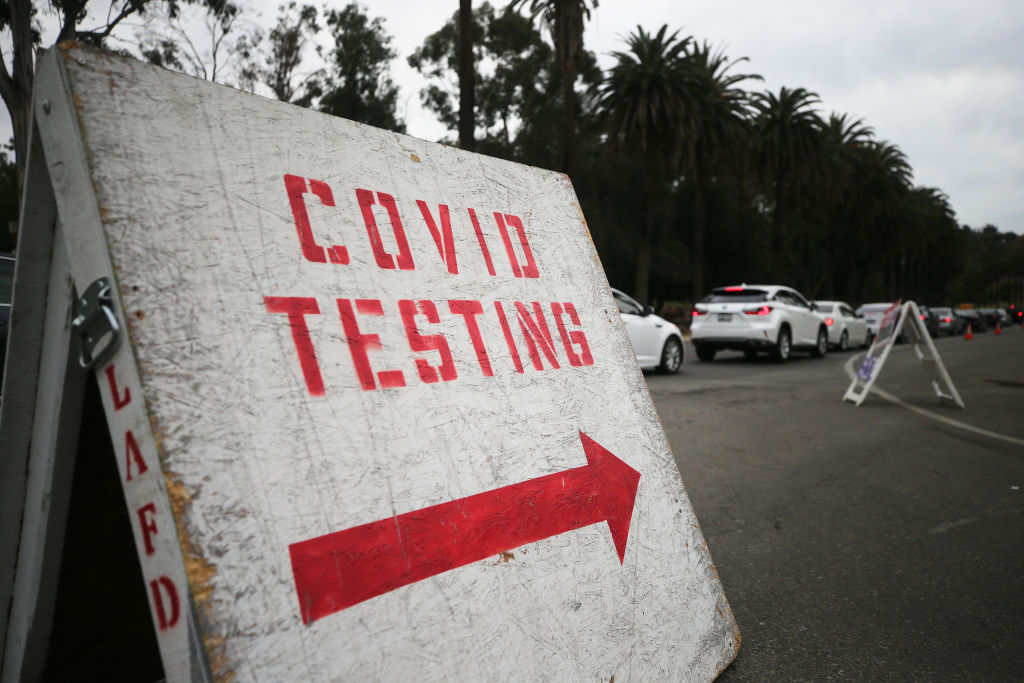In final words, former Alabama state senator says 'we messed up' on COVID-19


A free daily email with the biggest news stories of the day – and the best features from TheWeek.com
You are now subscribed
Your newsletter sign-up was successful
Before Larry Dixon, a former Republican Alabama state senator and director of the Alabama Board of Medical Examiners, died of COVID-19 last week at age 78, he shared with his wife one final message about the virus.
"We messed up," Dixon told his wife, Gaynell, according to longtime family friend David Thrasher. "We let our guard down. Please tell everybody to be careful. This is real, and if you get diagnosed, get help immediately."
About two weeks ago, Dixon attended an outdoor event "with a couple of guys," Thrasher told NBC News, and he was exposed to the virus. Thrasher, a pulmonologist, said he treated Dixon following his diagnosis, but after his condition worsened, Dixon was placed on a ventilator. Gaynell Dixon tested positive for COVID-19 last week and is recovering.
The Week
Escape your echo chamber. Get the facts behind the news, plus analysis from multiple perspectives.

Sign up for The Week's Free Newsletters
From our morning news briefing to a weekly Good News Newsletter, get the best of The Week delivered directly to your inbox.
From our morning news briefing to a weekly Good News Newsletter, get the best of The Week delivered directly to your inbox.
Larry Dixon spent 35 years as director of the Alabama Board of Medical Examiners and represented Alabama's Senate District 25 for 27 years, retiring in 2010. Prior to that, he was a member of the Montgomery City Council and the state House. Thrasher called Dixon "the finest human being," and told NBC News that at the end of his life, Dixon thought of others, encouraging them "to be careful, wear a mask, don't socially gather. He said, 'Let's save some lives.'"
There have been nearly 270,000 COVID-19 cases recorded in Alabama and 3,889 deaths. Over the last seven days, Alabama residents have tested positive for the virus at a rate of 34.7 percent.
A free daily email with the biggest news stories of the day – and the best features from TheWeek.com
Catherine Garcia has worked as a senior writer at The Week since 2014. Her writing and reporting have appeared in Entertainment Weekly, The New York Times, Wirecutter, NBC News and "The Book of Jezebel," among others. She's a graduate of the University of Redlands and the Columbia University Graduate School of Journalism.
-
 Political cartoons for February 14
Political cartoons for February 14Cartoons Saturday's political cartoons include a Valentine's grift, Hillary on the hook, and more
-
 Tourangelle-style pork with prunes recipe
Tourangelle-style pork with prunes recipeThe Week Recommends This traditional, rustic dish is a French classic
-
 The Epstein files: glimpses of a deeply disturbing world
The Epstein files: glimpses of a deeply disturbing worldIn the Spotlight Trove of released documents paint a picture of depravity and privilege in which men hold the cards, and women are powerless or peripheral
-
 Trump HHS slashes advised child vaccinations
Trump HHS slashes advised child vaccinationsSpeed Read In a widely condemned move, the CDC will now recommend that children get vaccinated against 11 communicable diseases, not 17
-
 FDA OKs generic abortion pill, riling the right
FDA OKs generic abortion pill, riling the rightSpeed Read The drug in question is a generic version of mifepristone, used to carry out two-thirds of US abortions
-
 RFK Jr. vaccine panel advises restricting MMRV shot
RFK Jr. vaccine panel advises restricting MMRV shotSpeed Read The committee voted to restrict access to a childhood vaccine against chickenpox
-
 Texas declares end to measles outbreak
Texas declares end to measles outbreakSpeed Read The vaccine-preventable disease is still spreading in neighboring states, Mexico and Canada
-
 RFK Jr. shuts down mRNA vaccine funding at agency
RFK Jr. shuts down mRNA vaccine funding at agencySpeed Read The decision canceled or modified 22 projects, primarily for work on vaccines and therapeutics for respiratory viruses
-
 Measles cases surge to 33-year high
Measles cases surge to 33-year highSpeed Read The infection was declared eliminated from the US in 2000 but has seen a resurgence amid vaccine hesitancy
-
 Kennedy's vaccine panel signals skepticism, change
Kennedy's vaccine panel signals skepticism, changeSpeed Read RFK Jr.'s new vaccine advisory board intends to make changes to the decades-old US immunization system
-
 Kennedy ousts entire CDC vaccine advisory panel
Kennedy ousts entire CDC vaccine advisory panelspeed read Health Secretary RFK Jr. is a longtime anti-vaccine activist who has criticized the panel of experts
